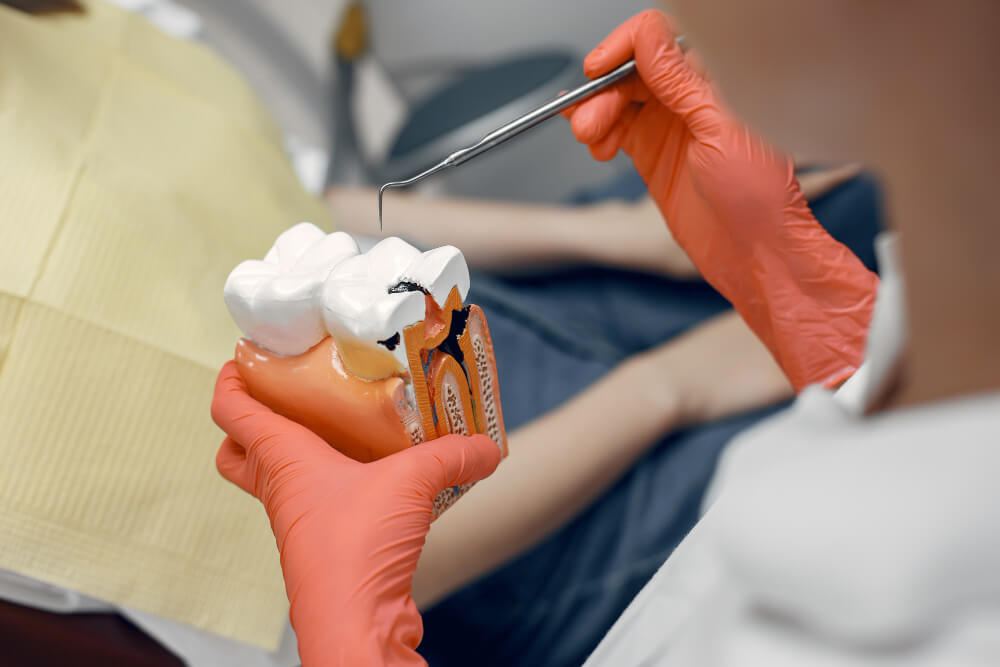Are ‘soft teeth’ a real condition or something else?
Have you ever heard someone say, “I get a lot of cavities because I inherited soft teeth from my parents.”
Do some people REALLY have soft teeth?
Well, yes and no. The REAL story is a bit more complicated…
When people say they have ‘soft teeth’, they usually mean they have soft enamel that gets cavities easily. Dental enamel is the hardest substance in the body, so what’s going on?
That said, there are several very rare genetic conditions that cause thin or pitted enamel but that all happens BEFORE you are born.
One condition is amelogenesis imperfecta or “congenital enamel hypoplasia” that occurs in about 1:14,000 people [1]. It’s a condition that affects the teeth, causing the enamel to be thinner while they are still developing, leaving the teeth weakened and more vulnerable to decay and often smaller than normal. This can occur in both baby teeth and permanent teeth.
However, if you define soft or ‘bad’ teeth as getting more cavities beginning in childhood, that usually means the enamel has been softened, making your teeth more susceptible to decay. But don’t blame your parents just yet!
There are several other possible reasons for easily developing cavities:
1 – Yes, genes can affect how your teeth and jaws develop, in some cases causing problems that may leave you prone to dental issues. For example, if your teeth – and/or jaws – don’t line up properly (malocclusion), chewing and biting can lead to daily stress on the tooth structure that can result in tiny (sometimes microscopic) fractures, weakening the tooth and possibly also leading to weakness in the gum tissue that holds teeth in place. Similarly, if you grind your teeth (bruxism) that can also weaken your enamel. [2]
2 – Also, if you brush your teeth too hard – often in a misguided attempt to make up for other poor oral health habits such as not flossing – you can actually wear down the tooth enamel, making your teeth more vulnerable to decay – and possibly resulting in sensitive teeth.[3]
This kind of wear usually appears just above the gumline on the facial (outer) surfaces of the teeth, the prime location for tooth sensitivity.
3 – Tooth enamel can also be weakened by biting hard objects (like eating ice or using your teeth as a bottle opener or similar tool).
4 – Another cause of weak teeth is frequent exposure to acid in food and drink. This can be from acidic foods (lemons), soft drinks many of which contain high levels of citric or phosphoric acid, alcohol (brandy is the most acidic with a pH of 3.5, with bourbon, scotch and most wines coming in a close second with a pH of 4) [4] Most expert sources suggest keeping your oral pH above 5.5.
5 – The eating disorder bulimia (induced vomiting after meals) can also erode your enamel from the stomach acid. [5]
If none of the above apply to me or my kids, and we weren’t born with genetically ‘soft teeth’ how can we still get so many cavities? We brush our teeth!
If that’s the case, it probably comes down to your oral health habit and lifestyle. Here are just a FEW of the factors that can contribute to having a lot of cavities, whether starting in childhood or as an adult.
I won’t bore you with the ‘brush and floss’ lecture you’ve undoubtedly heard from your dentist and hygienist, BUT here are some other things they may NOT tell you:
1 – Don’t eat sweets (especially sticky, sugar filled sweets when you can’t immediately brush) unless you use gum containing xylitol immediately afterward.
Here are links to some xylitol products on Amazon you may want to try:
For mouthwash and for for gum between meals
2 – Don’t drink soda unless you rinse your mouth out with (preferably salt) water immediately afterward (or better yet….lose the soda altogether!)
3 – Don’t share toothbrushes or eating utensils because cavity-causing bacteria may be transferred. This is especially true when feeding infants and toddlers!
4 – Quit smoking (or using tobacco in any form, including vaping). Tobacco smoking in general has shown a correlation with increased risk of cavities. [6] This goes for using tobacco-associated products in any form, including vaping – in fact, a specific unusual pattern of cavities has been reported in vapers. [7]
Here are a few MORE causes of cavities that you may NOT have heard of before:
1 – Make sure your child does NOT breathe through their mouth (while awake OR asleep). Mouth breathing dries the mouth, which encourages cavity-causing bacteria to flourish [8]
2 – Make sure YOU don’t breathe through your mouth.
3 – If you (or your child) snore, you are breathing with an open mouth which is a top warning sign you might have sleep apnea (OSA) – a significant health risk and should seek treatment from a sleep specialist.
4 – Do you have acid reflux (GERD)? Many people don’t even realize they have GERD if they only have a mild case – BUT – that acid will sit in your mouth for hours, especially at night, weakening your teeth, increasing risk of dental erosion and cavities- in one study, observed specifically in kids. See your doctor if you suspect you have this. [9]
5 – Eat a diet high in fruits and vegetables and low in sugars. Crunchy vegetables like carrots or fruits like apples can help to clean food debris off your teeth.
6 – Just because you brush and floss, doesn’t mean you’re doing a good job at getting rid of the bacteria that cause cavities. Adding an oral irrigator (water flosser) to your brushing routine can be really helpful to get rid of ALL the food particles in your mouth – especially in between your teeth – right before bed. Here is the one we use, available on Amazon.
7 – Instead of commercial mouthwash, rinse with a simple salt water solution. It kills the bacteria that cause not only cavities but also gum disease. It is also excellent to use after periodontal surgery and just as effective as chlorhexidine. [10] See also our article on mouthwashes here.
8 – Products containing xylitol, whether mouthwash, toothpaste, candies, chewing gum or xylitol-sweetened foods can really help those of us with a ‘sweet tooth’ reduce exposure to sugars. Xylitol has been shown in clinical studies to reduce cavity-causing bacteria by up to 90%. [11]
[Note: Some people experience mild to moderate digestive upset with xylitol. Try just a small bit first to be sure you’re not sensitive – and be sure to keep any xylitol-containing products away from dogs, as it can be highly toxic, especially for smaller dogs.]
Here are links to some xylitol products on Amazon you may want to try:
For mouthwash and for for gum between meals
Conclusion:
As you can see, the subject of ‘soft teeth’ can get pretty complex! It is extremely rare to be born with conditions that cause soft teeth (soft enamel) at birth. There are many factors that can affect the durability of your tooth enamel during your lifetime. Most are easily treatable, BUT some may need help to be diagnosed in collaboration with a qualified health practitioner (like for sleep apnea). There are products available that will help in the fight to overcome the root causes of ‘soft teeth’ and help you and your kids have strong, healthy teeth.
References:
[1] https://medlineplus.gov/genetics/condition/amelogenesis-imperfecta/#statistics
[2] https://pubmed.ncbi.nlm.nih.gov/33550467/
[3] https://pubmed.ncbi.nlm.nih.gov/16167604/
[4] https://pubmed.ncbi.nlm.nih.gov/31940633/
[5] https://pubmed.ncbi.nlm.nih.gov/31940633/
[6] https://pubmed.ncbi.nlm.nih.gov/31516477/
[7] https://pubmed.ncbi.nlm.nih.gov/32243711/
[8] https://my.clevelandclinic.org/health/diseases/22734-mouth-breathing
[9] https://www.mayoclinic.org/diseases-conditions/gerd/symptoms-causes/syc-20361940
[10] https://pubmed.ncbi.nlm.nih.gov/34916636/
[11] https://www.ncbi.nlm.nih.gov/pmc/articles/PMC4232036/

